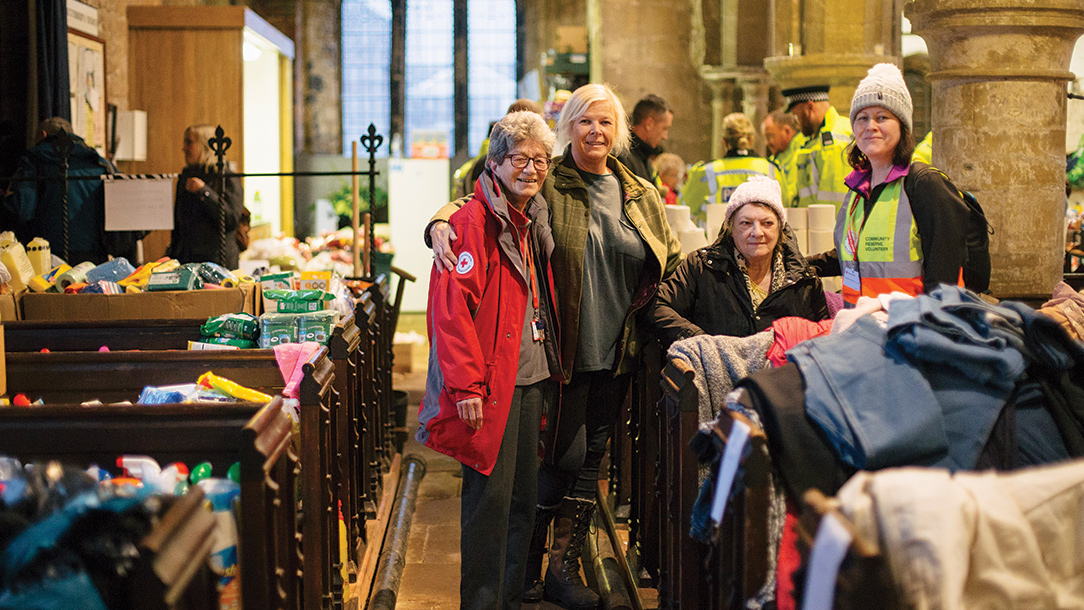“Bungalows were filled with water to the ceiling”
By Ann, a resident of Fishlake village, Yorkshire, which flooded in 2019
Last updated 8 March 2023
One minute I was in town getting the car serviced – and the next minute the phone was buzzing and my neighbours were telling me the [River] Don had broken its banks. Water was rushing towards our house. I called my daughter Amy at home and I told her to get out, fast.
Thankfully, Amy left quickly, and was brave enough to get our horses and run them to safety in their stables. It wasn’t long before the field where they’d been grazing was covered in icy cold water. The horses wouldn’t have survived without Amy’s quick thinking.
Once I reunited with Amy, we tried to drive through our village but it was swamped. It sounds mad to say it happened in England, but the water was flowing like a tsunami. There was a lot of noise, and debris and telegraph poles were bouncing along at the head of this huge wave of water.
The flood was just pouring through houses. Our neighbours were stood on their drives, totally bewildered. Some people were in their bedclothes, and some were clutching valuables. One poor old lady was holding an urn with her husband’s ashes.
If the flooding had begun a few hours later, I think people would have died in their beds. Some bungalows were filled with water to the ceiling.
FOR SOMEBODY TO SAY, 'CAN I POINT YOU IN THE DIRECTION OF THE HELP YOU NEED?', WAS INVALUABLE.
Later, the village church became a rest centre. The Red Cross volunteers were doing an incredible job making sure everyone was warm and had essential items like food, clothing and loo roll.
When something so dramatic as this has happened, you’re panicking. You’re in a spin. You might be thinking, ‘How do I turn the electricity off? How do I phone somebody?!’ So, it was incredibly helpful for the Red Cross to be there. They were so ready to give people an ear, lend advice, and be a shoulder to cry on.

©David Severn/British Red Cross
Ann and volunteers at the Red Cross rest centre
The days after that were a blur. We had to move the horses again because the water was creeping into their stables, so a neighbour gave us a ride in his tractor. It was a good job too – if we’d tried to get there by foot, we could have been swept away. The road was probably 20ft deep in places.
The horses are safe now. But as the water has drained away, lots of other wildlife seems to have died or been driven off.
Weirdly, there’s thousands of dead worms in our fields, meaning the creatures that feed on those have gone. Where we had newts and toads, it’s just all still waterlogged and bluey-black with kerosene from god knows what. And for the farmers around us, it’s probably going to take two harvests now to get back to normal. All the grass is rotten.
The aftermath of something like this isn’t something that gets talked about much. We’re back in our house and the TV cameras are long gone. And, I guess, ever so slowly, we’re coming to terms with what’s happened. But our village might never be the same.
There’s a hive of activity in the daytime for those lucky enough to have found contractors to do repairs or got permission from the insurance companies.
But there are still people who have no insurance, or who are fighting with their insurer. There are elderly people who haven’t the means or the ability to deal with their houses. Can you see an 85-year-old on their hands and knees, scrubbing out mud from the carpet? My neighbour lived in the village all his life but has had to move to a nearby town.
OUR VILLAGE MIGHT NEVER BE THE SAME.
If you came tomorrow morning and the sun was shining and you didn’t know our village had ever been flooded, you’d probably think ‘Well, there’s buses around, cars on the road, everyone’s busy ‒ everything’s fine!'
But if you just look a bit closer, you would see that there’s steam in the house windows. The curtains look mouldy. You’d see there’s no car in the drive and instead there’s a skip. And in that skip, there are remnants of someone’s life, their personal possessions.
Floods have real long-term effects that don’t always make it into the news.
What I do know is that despite all the trauma, there have been some positives. The flooding has really bonded the community together. Neighbouring communities have raised money and helped our village. People from the village, the church and the Red Cross have worked tirelessly.
You realise you’re not just a name or a number. You’re part of this bigger picture. It’s been amazing, really, the support that there’s been around people through it all. And what’s more, I know now that you’d all be there again.
Ann, Fishlake resident
When the River Don breached its banks in November 2019, water swept through the village of Fishlake, South Yorkshire. Ann, a retired nurse and Fishlake resident, was there during the initial floods and the aftermath. Her story was told to our Stories team over two interviews in November and December 2019.
Emergencies in the UK
We respond to an emergency in the UK every four hours. People are at the heart of what we do. If you’re inspired by what you’re reading on Stories, please consider donating to make sure we’re ready to spring into action.
Donate